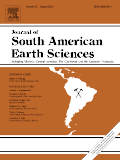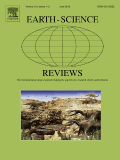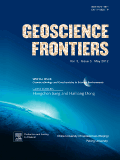
AGU Advances
Scope & Guideline
Transforming Ideas into Impactful Research
Introduction
Aims and Scopes
- Interdisciplinary Research:
The journal encourages contributions that bridge multiple disciplines within Earth and space sciences, fostering collaboration and integration of knowledge across fields such as geology, meteorology, oceanography, and environmental science. - Climate Change and Environmental Impact Studies:
A significant focus on climate change, including its impacts on ecosystems, carbon cycles, and weather patterns, reflects the journal's commitment to addressing urgent environmental issues and promoting sustainable practices. - Geophysical and Geological Investigations:
Research on geophysical phenomena, including seismic activities, mantle dynamics, and tectonic processes, forms a core part of the journal's scope, enhancing our understanding of Earth's physical processes. - Remote Sensing and Observational Sciences:
The journal highlights advancements in satellite and remote sensing technologies that contribute to environmental monitoring, climate studies, and geospatial analysis, demonstrating the importance of observational data in Earth sciences. - Astrobiology and Planetary Sciences:
Research exploring planetary environments, astrobiological potential, and extraterrestrial geology is integral to the journal, showcasing its commitment to understanding not only Earth but also other celestial bodies.
Trending and Emerging
- Climate Feedback Mechanisms:
Recent publications increasingly explore the feedback mechanisms between climate variables and ecosystems, emphasizing the complex interactions that affect carbon cycles, hydrology, and weather patterns. - Urban Climate and Sustainability:
The rise in studies addressing urban environments and their impact on climate change indicates a growing recognition of the need for sustainable practices in urban planning and development. - Anthropogenic Effects on Natural Systems:
Research increasingly focuses on the impacts of human activities on natural systems, including land use changes, carbon emissions, and environmental degradation, reflecting a critical need for understanding anthropogenic influences. - Technological Innovations in Earth Observation:
Emerging themes include the use of advanced technologies for Earth observation, such as machine learning and remote sensing, which enhance our ability to monitor and model environmental changes effectively. - Ecosystem Responses to Climate Variability:
There is a notable trend towards investigating how ecosystems respond to climate variability and extreme weather events, highlighting the importance of ecological resilience and adaptation strategies.
Declining or Waning
- Traditional Geology and Stratigraphy:
There has been a noticeable decrease in publications focused solely on traditional geological methods and stratigraphic studies, as interdisciplinary approaches gain traction and the need for broader environmental contexts becomes more apparent. - Localized Environmental Studies:
Research centered on localized environmental issues may be waning, potentially overshadowed by studies emphasizing global perspectives on climate change and its multifaceted impacts. - Historical Climate Reconstructions:
While historical climate studies remain important, there is a trend towards more immediate and predictive climate modeling, which may lead to a reduced focus on purely historical reconstructions.
Similar Journals

JOURNAL OF SOUTH AMERICAN EARTH SCIENCES
Pioneering Research in South American Earth SciencesJOURNAL OF SOUTH AMERICAN EARTH SCIENCES is a premier interdisciplinary journal dedicated to publishing high-quality research in the fields of Earth-Surface Processes, Geology, and Paleontology, making it an essential resource for scientists and researchers focused on South American geology and its diverse geological phenomena. Published by Pergamon-Elsevier Science Ltd in the United Kingdom, this journal has been instrumental in disseminating groundbreaking studies since 1988, showcasing contributions that push the boundaries of knowledge in Earth and Planetary Sciences. With an impressive Scopus ranking—positioning it in the 74th percentile for Paleontology and 71st for Geology—this journal not only reflects robust academic quality but also its commitment to addressing critical geological challenges in South America. Researchers will appreciate its objective of advancing understanding of geological processes while providing insights into past, present, and future Earth environments. Although available through traditional subscription models, the journal's vast repository of articles enriches the academic landscape, facilitating the sharing of vital research among professionals, students, and geological practitioners.

GEOSCIENCES JOURNAL
Advancing Knowledge in Earth and Planetary Sciences.Welcome to the GEOSCIENCES JOURNAL, a pivotal publication in the fields of Earth and Planetary Sciences and Environmental Science, proudly presented by the Geological Society of Korea. Established in 1997, this journal has become a prominent platform for researchers, professionals, and students, offering a rich collection of peer-reviewed articles that explore a diverse array of geoscientific topics. With an impressive Q2 ranking in both Earth and Planetary Sciences and Environmental Science categories for 2023, it stands as an essential resource in the academic community. Though it operates under a traditional subscription model, GEOSCIENCES JOURNAL remains dedicated to advancing knowledge through rigorous research. Addressed from its headquarters in Seoul, South Korea, the journal aims to foster a deeper understanding of geosciences, encouraging innovation and collaboration in tackling today’s environmental challenges.

Environmental Earth Sciences
Advancing knowledge for a sustainable Earth.Environmental Earth Sciences is a prestigious journal published by Springer, dedicated to advancing knowledge in the multifaceted fields of Earth Sciences, including Earth-Surface Processes, Environmental Chemistry, Geology, and Soil Science. With an ISSN of 1866-6280 and an E-ISSN of 1866-6299, this journal occupies a notable position in the academic landscape, consistently ranked in the Q2 category across multiple disciplines in 2023. It supports open access to foster wider dissemination of impactful research, enhancing visibility and accessibility for authors and readers alike. The journal's ongoing commitment to publishing innovative studies and reviews makes it an essential resource for researchers, professionals, and students alike. With a strong focus on addressing contemporary environmental challenges, Environmental Earth Sciences invites contributions that are both original and interdisciplinary, making a significant impact in understanding Earth dynamics and sustainability.

Journal of Asian Earth Sciences-X
Bridging Regional Insights with Global PerspectivesJournal of Asian Earth Sciences-X, a distinguished publication by ELSEVIER, is at the forefront of Earth and planetary sciences, particularly focusing on the dynamic fields of geology and earth-surface processes. As an Open Access journal since 2019, it provides unparalleled access to high-quality research, fostering global collaboration and dissemination of knowledge. With an impressive impact factor and ranking in the Q2 category for both Earth-Surface Processes and Geology, it serves as a crucial platform for researchers, professionals, and students alike to share their findings and insights. Situated in the United Kingdom, the journal thrives on contributions that enhance our understanding of Asian geosciences within a broader global context, aiming to tackle major challenges such as climate change and natural resource management. By bridging regional studies with global perspectives, the Journal of Asian Earth Sciences-X is not only a vital resource for academia but also supports sustainable development initiatives across the region.

Earth and Space Science
Championing Open Access for Earth and Space Innovations.Earth and Space Science, published by the American Geophysical Union, is a distinguished open-access journal that has profoundly impacted the realms of earth and planetary sciences as well as environmental science since its inception in 2014. With impressive rankings, including Q1 in both Earth and Planetary Sciences and Environmental Science for 2023, this journal ranks 38th out of 195 in the general Earth and planetary sciences category and 51st out of 219 in environmental science, showcasing its commitment to high-quality research dissemination. The journal serves as a vital platform for researchers, professionals, and students, fostering the exploration of critical topics and advancements within these pivotal fields. With an accessible format, researchers can benefit from the rich content available, furthering their knowledge and ensuring that groundbreaking discoveries reach a broader audience. The journal's ongoing commitment to open access aligns with contemporary trends in scholarly communication, emphasizing inclusion and collaboration in tackling pressing global challenges.

EARTH-SCIENCE REVIEWS
Elevating research with rigorous reviews and impactful studies.EARTH-SCIENCE REVIEWS, published by Elsevier, is a prestigious journal in the field of Earth and Planetary Sciences. With an impressive impact factor and ranked in the Q1 quartile for its category, this journal has established itself as a leading platform for the dissemination of high-quality research and reviews. Spanning topics within general Earth and planetary sciences, the journal provides a unique confluence of interdisciplinary studies, serving researchers, professionals, and students who seek to deepen their understanding and foster advancements in the field. Based in the Netherlands, the journal has been integral to the scholarly community since its inception in 1966, with an ongoing commitment to presenting cutting-edge reviews that propel scientific discussions forward. While it does not offer open access options, its rigorous review process and high-ranking status make it a valuable resource for anyone engaged in earth sciences.

Geoscience Frontiers
Connecting Scholars to Shape the Future of GeoscienceGeoscience Frontiers is a premier open-access journal that has been at the forefront of disseminating impactful research in the field of Earth and Planetary Sciences since its inception in 2010. Published by China University of Geosciences, Beijing, this journal operates from the Netherlands and has gained recognition for its rigorous peer-review process and high standards of scholarship, earning a distinguished position as Q1 in the Earth and Planetary Sciences category. With a Scopus ranking of 5 out of 195, placing it in the 97th percentile, it reflects the journal's commitment to addressing global geological challenges and advancing our understanding of the Earth’s dynamic systems. As an open-access platform, Geoscience Frontiers ensures that vital research is widely accessible, fostering collaboration and innovation among researchers, professionals, and students alike. By providing a forum for cutting-edge discoveries and theories, the journal plays a critical role in shaping the future of geoscientific research and education.

China Geology
Pioneering Research in Earth Planetary SciencesChina Geology, published by KEAI PUBLISHING LTD, is a leading open-access journal that serves as a pivotal platform for disseminating high-quality research across a wide spectrum of Earth sciences. Since its inception in 2018, the journal has rapidly established itself with an impressive Q1 ranking in multiple critical categories, including Geology, Economic Geology, and Oceanography, among others, reflecting its significant contribution to the academic community. Positioned as a top-tier journal in the Earth Planetary Sciences domain, it ranks #22 out of 321 in Geology and exhibits an admirable impact in sub-fields such as Earth-Surface Processes and Geochemistry and Petrology. China Geology is committed to promoting rigorous scientific inquiry and facilitating the open exchange of knowledge in the geosciences, making it an essential resource for researchers, professionals, and students eager to explore innovative developments and fundamental advances in geology. The journal’s accessibility ensures that critical findings reach a broad audience, thereby enhancing collaboration and driving forward scientific discourse in the global community.

Frontiers of Earth Science
Unveiling the Secrets of Earth ScienceFrontiers of Earth Science is a prominent academic journal in the field of Earth and Planetary Sciences, published by Springer. With an ISSN of 2095-0195 and an E-ISSN of 2095-0209, this journal serves as a significant platform for researchers and professionals to disseminate their findings from 2007 to 2024. It is recognized for its impactful contributions within the category of Earth and Planetary Sciences, boasting a respected Q2 ranking in 2023. With a Scopus ranking of 64 out of 195, placing it in the 67th percentile, Frontiers of Earth Science continues to drive academic dialogue and innovation. The journal is dedicated to exploring a diverse range of topics, including geology, meteorology, and environmental science, and amplifying the understanding of Earth systems through rigorous research. Located in New York, USA, this journal embraces an Open Access model, ensuring that groundbreaking research is readily available to the global scientific community, thereby enhancing its accessibility and impact.

Geosciences is a prestigious open-access journal published by MDPI, dedicated to advancing research in the field of Earth and Planetary Sciences. Since its inception in 2011, this journal has fostered a collaborative environment for the dissemination of innovative ideas and findings, contributing significantly to the academic community's understanding of complex geological processes. The journal has achieved a commendable 2023 ranking in the second quartile (Q2) within its category, highlighting its impact and relevance in the field, with a Scopus rank of #41 out of 195 journals, placing it in the 79th percentile. With an aim to span a broad range of topics from environmental geology to planetary exploration, Geosciences is pivotal for researchers, professionals, and students looking for an accessible platform to share their work and stay informed of the latest developments. As a fully open-access journal, it ensures that high-quality research is freely available, fostering greater dissemination of knowledge across the globe.